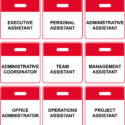
Some female Executive Assistants still view any peer as a threat; we can and must do better, says Marion Freund
I grew up with an extremely smart older brother. To me, learning was easy for him, and he knew everything. It is strange growing up with a brother like that. On the one hand, I automatically also learned a lot; on the other hand, everything I said or thought I knew was constantly being questioned and disputed.
While I admired his knowledge, I hated that he always got a kick out of questioning or correcting me. The result of this experience is that I learned, early on, that others know some things better than me and that it is easier to learn these things by asking them for help. People feel complimented and are happy to share their experiences if you ask them. Since I am terrible at small talk, it has become my way of getting to know people.
Throughout my 20+ year career, I’ve observed that many Executive Assistants cannot or stubbornly won’t admit that they need help. From watching sometimes painful situations, listening to conversations, and communicating with peers with similar experiences, I have concluded that they are:
- Afraid to ask for help because they are concerned about being perceived as incompetent
- Habituated in their routine, not considering that there might be a different or better way
- Feeling threatened by anybody who seems to know more and is more effective than they are
Social Expectations
For centuries, females have been socialized to compete with other women. The Executive Assistants of the world are 93-97% female; therefore, these ideas about how women relate to one another are important. We compare and decide who is prettier, who has the better figure, and who has the most impressive home. We notice who manages to get the most handsome and successful man’s attention, make the best match, and live the most comfortable life.
These conflicts are the premise of many classic pieces of literature and paperback novels (Jane Austen: Pride and Prejudice; Elizabeth Gaskell: Wives and Daughters; Julia Quinn: Bridgerton). There was only one heir to the throne or the family business, and every female in the vicinity competed for this prized specimen of a husband. Their future livelihood depended on it. Mostly, we’ve left these century-old ideas behind us. We are modern women. Unlike previous generations, many women do not rely on their spouse’s favors and achievements. We have developed from the housekeeper, depending on our husband’s social standing and occupation, to successful professionals, making a name and a profession of our own. We have careers, accomplish our successes, build our own lives, and are independent, intelligent, and effective. Yet we have replaced the family heir with another highly coveted prize: the C-level executive.
Women Behaving Badly
Some female Executive Assistants still view any peer as a threat, as spotlighted in Bonnie Low-Kramen’s article from 2018, “Women: Turning Off the Default”. We master technology, are proficient in solving impossible challenges, and successfully take care of multiple responsibilities with ease, yet some Executive Assistants respond negatively, even aggressively, if another Executive Assistant is obviously more proficient in a particular area. Instead of taking the opportunity to learn, their typical response is turning on the other person.
In my career, I have observed men behaving differently than women. A man meets another man who is better at anything; he befriends that man, tries to learn all he can from him, and even tries to master the skill better. A woman meets another woman who is better at anything; she feels threatened and blocks her where she can. She tries to avoid anybody noticing that another woman knows something she doesn’t.
Both women and men are still far from being treated equally in the workplace. Women’s jobs are more vulnerable than men’s jobs. If there is a personal crisis to deal with, the woman typically opts out of her employment to take care of sick family members, parents, and children. In the post-pandemic workplace, men are being hired back at a higher rate than women. Women are more likely to be employed in lower-paying jobs. Considerable research shows that the pandemic set back women’s progress in the workplace (Justin Jablonska, McKinsey&Company, March 8, 2021).
Support, Teach and Mentor
Aren’t the odds already stacked up high enough against women? Isn’t it better to reach out to each other, help, lift each other up, and send the elevator back down? I believe women could be even more successful in establishing themselves in their careers if we would support, teach, and actively mentor each other. If there is something we don’t know or would like to learn, we should reach out to each other and figure things out together.
I love working with other Assistants, especially when they are younger or just starting out. They show me there is always another way of looking at or approaching work, and they help me keep up to date with the latest technologies. Seeing them bloom and discover that the Executive Assistant position is an exciting, ever-changing profession is fun.
I also enjoy helping experienced Executive Assistants learn things they have difficulty mastering and showing them how to do something they were afraid of attempting. Once I understand why they have a problem, I know there is a solution to fix it. It is remarkable to see how somebody who was insecure can increase their confidence and self-esteem when they overcome something they have been struggling with for a long time. It makes me smile when somebody suddenly enjoys and even volunteers to do a previously dreaded task because they finally understand it and can’t wait to prove it.
Executive Assistants are the frontline problem-solvers of our workplace. I know it is sometimes hard to admit there is something we don’t know or fully understand. That is normal. Everybody struggles with something. With businesses and technology developing ever faster, we will always run into something we don’t know – yet. But we can learn. That is what professional development is about and why it is so important.
Conclusion
My best advice is that if there is anything you don’t know, and you know somebody who does – ask. You are not embarrassing yourself. You are not going to be in danger of being replaced. You will find that you willingly get the help you need. We are Executive Assistants – we love to help! Lean on each other and help each other grow. We can do better. We are here for you. I am here for you.













